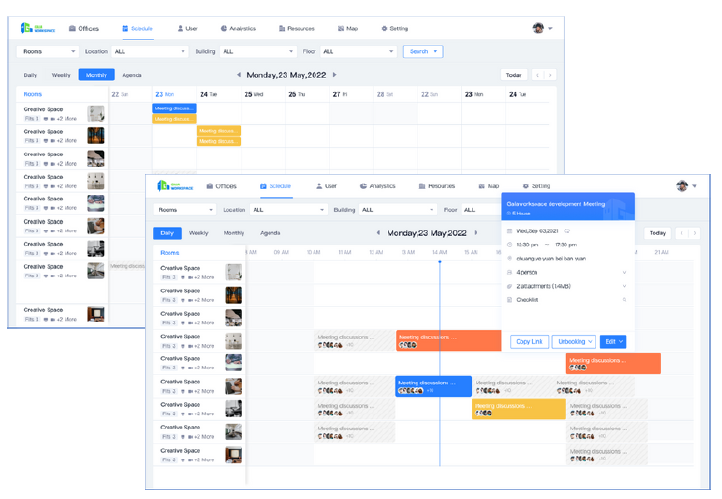In an era marked by rapid technological advancements and evolving workplace dynamics, organizations are constantly seeking ways to optimize their operations. One area that has gained significant attention is workspace management. The advent of workspace management solutions has revolutionized the way businesses operate, offering a range of benefits that extend beyond just efficient space allocation. In this article, we will explore the Return on Investment (ROI) of workspace management solutions and how they can positively impact an organization’s bottom line.
Understanding Workspace Management Solutions
Workspace management solutions encompass a wide array of software and hardware tools designed to streamline the allocation and utilization of office spaces. These solutions often include features like room booking systems, desk reservation platforms, occupancy sensors, and comprehensive analytics dashboards. They aim to enhance workplace efficiency, improve employee satisfaction, reduce operational costs, and drive sustainability efforts.
The Significance of Workplace Management Technology
In the ever-evolving landscape of work, workplace management technology emerges as a vital catalyst for efficiency, collaboration, and adaptability. This multifaceted technology encompasses tools and platforms that streamline various aspects of the workplace, responding to the demands of a changing workforce and shifting employee expectations. Key trends, including remote and flexible work arrangements, digital skills development, data-driven decision-making, and automation, underscore the importance of workplace management technology in facilitating organizational success. By creating seamless virtual workplaces, prioritizing employee well-being, and harnessing data-driven insights, organizations can navigate the digital transformation journey effectively. However, it’s essential to recognize that workplace digital transformation transcends technology, emphasizing the cultivation of a culture of innovation, continuous learning, and adaptability within the organization. In this dynamic environment, the convergence of technology, culture, and data-driven insights shapes the future of work and determines organizational success.
How does Workspace Management Solution Benefit Non-Profit Organizations
Most non-profit organization are dedicated to improving the quality of life in underserved communities through education, healthcare, and social support programs. They a dedicated team of employees and volunteers working in various capacities to achieve its mission.
Challenges
Limited Office Space: They operate on a tight budget and has limited office space for its team members, which often leads to overcrowded work areas and difficulties in finding meeting rooms or collaborative spaces.
Resource Allocation: They frequently host events, workshops, and meetings in the community, but they struggle with efficiently allocating resources like meeting rooms, projectors, and laptops for these events.
Volunteer Management: They rely heavily on volunteers who work irregular hours. Coordinating volunteer schedules and workspace availability is a logistical challenge.

Benefits
Cost Savings
Optimized Space Usage: Workspace management solutions help non-profits make the most efficient use of their office space. This can lead to reduced rent costs and lower utility bills, allowing organizations to allocate more funds to their core programs.
Improved Productivity
Streamlined Resource Booking: Non-profits often have limited resources such as meeting rooms, projectors, or office equipment. Workspace management solutions enable employees to easily reserve these resources, reducing time wasted searching for them.
Enhanced Collaboration: Efficiently scheduling collaborative spaces and meeting rooms can foster better teamwork and productivity among staff and volunteers.
Data-Driven Decision Making
Real-Time Analytics: Workspace management solutions often provide data on space utilization. Non-profits can use this data to make informed decisions about space allocation and resource planning, reducing wasted space and resources.
Enhanced Employee and Volunteer Satisfaction
Improved Work Environment: A well-managed workspace that meets the needs of employees and volunteers can lead to higher job satisfaction and potentially reduce turnover.
Volunteer Experience: For non-profits that rely on volunteers, providing them with a well-organized and efficient workspace can enhance their volunteer experience, leading to increased commitment and retention.
Streamlined Operations
Resource Allocation: Non-profits often need to allocate resources for events, workshops, and programs. Workspace management solutions can streamline the allocation process, ensuring that resources are available when and where they are needed.
Workspace management solutions can benefit non-profit organizations by optimizing space usage, improving productivity and collaboration, enhancing volunteer management, reducing costs, and aligning with sustainability goals. These benefits ultimately contribute to the organization’s ability to carry out its mission effectively and efficiently.
Maximizing ROI with Workplace Management Platforms: Best Practices
To maximize ROI with workplace management platforms, organizations should follow best practices, including adopting a holistic approach to ensure seamless integration across systems, promoting cross-functional collaboration, and aligning platforms with strategic goals. This approach optimizes productivity, reduces inefficiencies, and enhances operational effectiveness. Additionally, organizations should prioritize accurate workplace analytics, leveraging data on employee behavior, productivity, and resource utilization to make informed decisions, allocate resources effectively, and achieve cost savings. Integrating data sources, implementing data collection mechanisms, and defining relevant KPIs are crucial components of successful workplace analytics. By analyzing platform usage and effectiveness, organizations can make data-driven decisions to optimize technology investments and ensure alignment with business objectives, ultimately driving positive ROI.
Conclusion
Workspace management solutions offer a compelling ROI for organizations looking to optimize their real estate, enhance employee productivity, and improve the overall workplace experience. By reducing operational costs, increasing productivity, and creating a better work environment, these solutions provide a comprehensive approach to managing the modern workplace. As organizations continue to adapt to changing work paradigms, investing in workspace management solutions is a strategic decision that can yield significant returns in the long run, making it a sound choice for businesses of all sizes.

